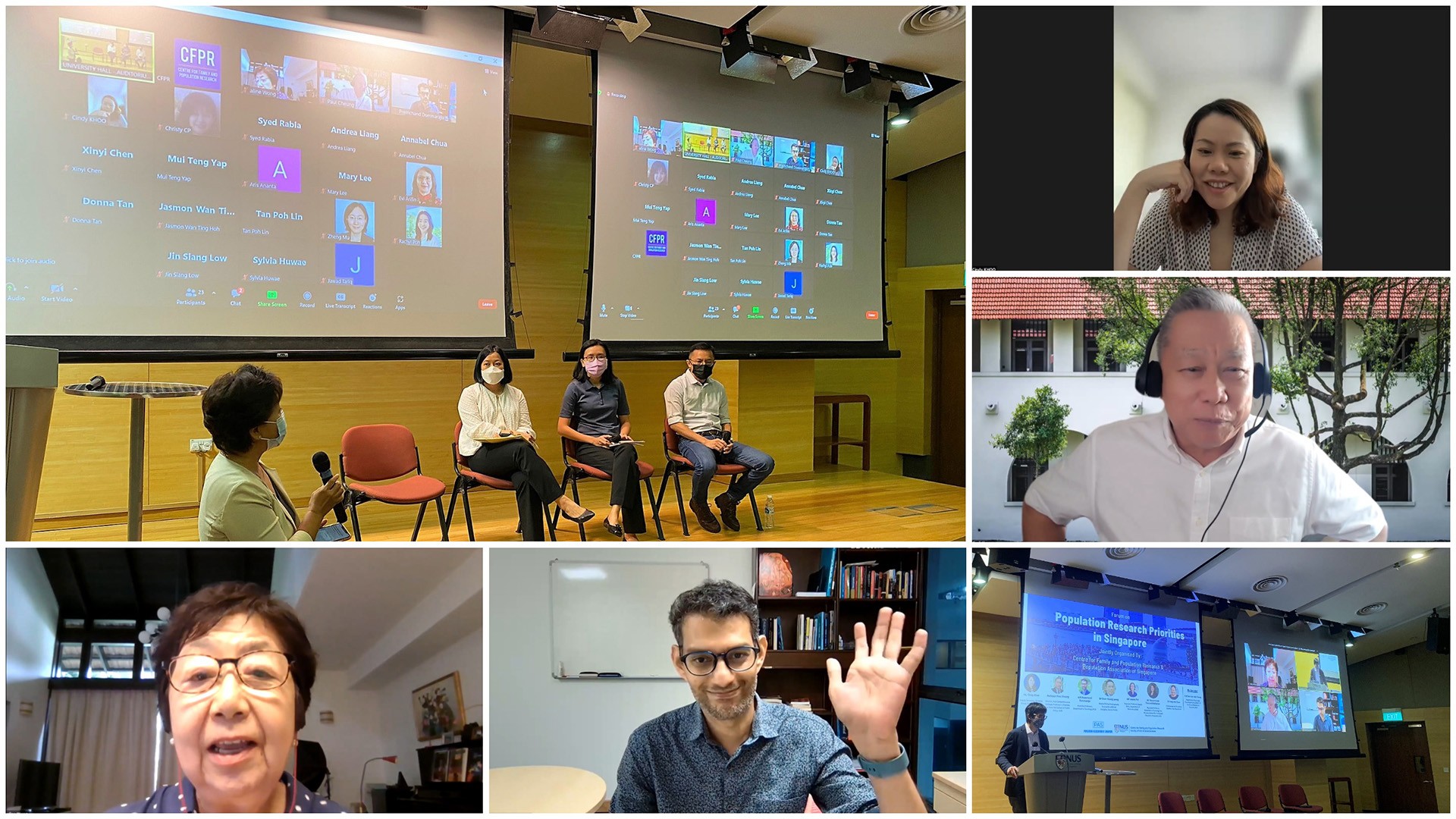Population Futures in Singapore: From National to City Demography
What policy actions ought to be taken or considered for solving Singapore’s population issues? And, what makes Singapore an interesting case for academics and policymakers alike, in relation to other societies?
These were questions Associate Professor Vincent Chua, Co-Director of the Centre for Family and Population Research (CFPR) at the NUS Faculty of Arts and Social Sciences (FASS), posed to kickstart the “Forum on Population Research Priorities in Singapore” on 31 March 2022. He emphasised three facets of population that make studying it an urgent one. First, that populations are contextual; second, that populations are always evolving: and third, that populations are unique to their respective societies.
Jointly organised by CFPR and the Population Association of Singapore (PAS), the Forum was a platform for identifying and discussing several of Singapore’s most pressing population issues. It adopted a hybrid meeting format that featured six distinguished speakers — Ms Cindy Khoo, Deputy Secretary of Strategy Group at the Prime Minister's Office; Prof Paul Cheung, Director of Asia Competitiveness Institute and Professor in Practice at the NUS Lee Kuan Yew School of Public Policy; Assoc Prof Premchand Dommaraju from the Department of Sociology at Nanyang Technological University; Dr Chan-Hoong Leong, Head of Policy Development, Evaluation and Data Analytics at Kantar Public; Assoc Prof Jessica Pan, Dean's Chair at the NUS FASS Department of Economics; and Assoc Prof Bussarawan Teerawichitchainan, the Co-Director of CFPR also from the NUS FASS Department of Sociology. The event was moderated by CFPR Founding Director Prof Jean Yeung.
How populations are contextual, evolving and unique to their respective societies
Setting out the policy context, Ms Khoo spoke about a list of demographic challenges facing Singapore, such as Singapore’s slow population growth where the total fertility rate (TFR) continues to drop, the rise in the old-age dependency ratio, and changes in the family, including the rise of single-person households. She revealed that Singapore’s goal was to build a “resilient population” – one that is self-sufficient with opportunities for economic growth, but at the same time, a society that incorporates social diversity which strengthens social cohesion.
On Singapore’s declining marriage and fertility rates, Prof Cheung explained this can be attributed to changing attitudes toward marriage and the family. He spoke about the difference between a “national demography” and a “city demography”, noting that while much data and knowledge has been collated on the national profile, much remains unknown about the “city” more broadly, as one that includes foreigners in our midst. He spoke candidly about the need for data-sharing between academia and government in order to maximise our knowledge of Singapore as a “city” in the making.
Assoc Prof Dommaraju noted that much of the research, at least in Singapore, has focused on traditional and stable families, but that Singapore has new and emergent forms of family structures that ought to be studied systematically.
Drawing attention to the neighbourhood perspective, Dr Leong explained how the neighbourhood is a major site of social cohesion. He suggested that shared amenities such as shopping malls and community clubs would make a difference in decreasing social tensions between groups and improving the quality of social interactions, particularly between foreigners and locals.
Speaking from an economic and a gender perspective, Assoc Prof Pan highlighted that the declining marriage and fertility rates in Singapore were mainly due to the reversal of the gender gap in higher education and rising economic opportunities for women. Nevertheless, she stressed that women remained dominant providers of childcare within modern-day households, which highlights the career-family trade-offs that working mothers are confronted with daily.
Based on her research experience on older adults in Singapore and Southeast Asia, Assoc Prof Teerawichitchainan underscored the importance of situating Singapore against the backdrop of broader demographic trends in Southeast Asia, to help guide Singapore’s future policymaking. For example, rapid population ageing in neighbouring Southeast Asian countries calls into question the sustainability of Singapore’s reliance on foreign workers to address long-term care needs.
Accessibility of data for demographic researchers
One common issue raised by the research experts at the Forum was the need for broader collaboration between researchers and the government in terms of access to individual-level census and administrative data.
For instance, Prof Cheung highlighted that inaccessibility to data on Singapore’s demographic composition, especially its migrant population, has made it harder for researchers to do in-depth analyses in order to better understand the city’s demography.
Sharing his views on family formation, family dissolution and increasing diversity in family structures, Assoc Prof Dommaraju mentioned that Singaporean researchers do not yet have data on family diversity in order to study its impact on family members and children.
Assoc Prof Pan also pointed out the potential of leveraging rich administrative data and combining it with nationally representative survey data.
In response to suggestions for greater collaboration between government agencies and researchers, Ms Khoo opined that researchers could be provided access to sensitive data on a project-by-project basis for their research to be relevant to addressing Singapore’s pressing needs. She also noted an increasing interest in qualitative research by the government, to help them better understand the wide diversity of lived experiences that can inform policymaking.
Work-Family Trade-Offs
In response to the question of “What will actually improve TFR?”, Ms Khoo stated that policymakers are looking at increasing support for flexible work arrangements, childcare and parental care arrangements.
Acknowledging that a “parenthood penalty” affects both parents where the penalty for a father taking time off for childcare may be even higher than that for mothers, Assoc Prof Pan highlighted that there should be flexible work arrangements for both men and women.
In closing, the moderator, Prof Jean Yeung emphasised the importance of focusing on young people’s well-being and their needs, including understanding their changing attitudes towards family and tackling emerging issues, such as work-family issues as a society.
By the Centre for Family Population and Research at NUS Faculty of Arts and Social Sciences



